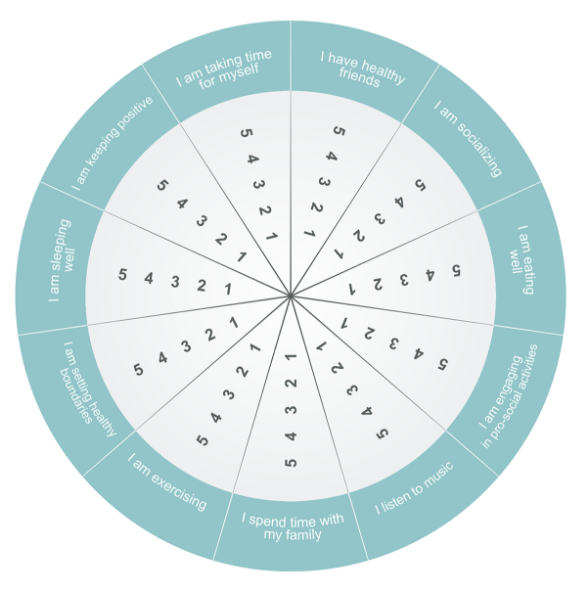Pediatric Vasculitis
Self-Care
Self-care is the purposeful engagement in activities or strategies that promote healthy functioning and improved well-being. Although physicians and parents play a significant role in our care, it is vital to understand the importance of self-care and how you can nurture your mental well-being.
It is important to note that self-care looks and feels different to every person. Factors such as experience with the disease, coping skills, motivation, confidence, habits and support from others can influence self-care.
Vasculitis requires not just medical intervention but behavioral intervention as well. Self-care is necessary for everyone, but this is especially true for those affected by Vasculitis.
Prioritize
Prioritize the things you need to get done each day; this will help lessen feelings of not being in control. Work towards accepting the new “normal” as you experience changes in your daily routine, school, family, and social time.
Set Limits
Recognize your strengths and weaknesses. Know what you can handle on your own and when it is time to ask for help. There is no shame in acknowledging your limits. It is better to ask for help instead of getting burned out. It is also a good idea to practice the art of saying “No.” Do not agree to everything to please your friends or a family member.
Join a Support Group
Support groups are the perfect place to talk with other young people impacted by vasculitis; they provide encouragement and offer an opportunity to discuss anxieties and concerns with others who share the same experiences. Having a place to exchange information and advice may provide a sense of control and reduce feelings of hopelessness and helplessness.
Learn More About Vasculitis Foundation Support Groups
Consider Seeing a Therapist or Counselor
Whether it is a counselor, social worker, or psychologist; it may be a good idea to have a space that is yours to talk about your thoughts and feelings and gain strategies for coping.
Move Your Body
The benefits of exercise are well proven for both mind and body. Go on light walks or other activities when you can. Get in the habit of moving daily.
Nourish Your Body
Ensuring you receive regular nourishment with a variety of foods is essential. When the body can depend on regular nourishment, there is less physiological stress and it is more capable of focusing on healing.
Prioritize Sleep
Sleep deprivation is detrimental to a person’s thinking and physical and emotional state. It is not easy fitting this into a schedule filled with academic, social, and recreational activities. When trying to manage the impact of vasculitis, a shift to healthy sleep hygiene is essential. To improve your sleep quality, try to go to bed at the same time every night. Use calming techniques to help you fall asleep if you need to.
Fatigue is very common in anyone with vasculitis and often begins before diagnosis and may persist even during or after treatment. Pay attention to what is taking up your energy. Listen to your body, rest when needed, and have clear boundaries. Learn to say “No.”
You may find value in using the Spoon Theory to help you manage your time and as a tool to help explain your need for more rest to friends and family.
Give Your Mind a Break
Renew your mental energy with activities such as meditation, spendng time with friends or family, watching a favorite movie or television program, or reading a book. This quiet or downtime is necessary to help you cope with the fatigue and stressors of vasculitis.
Whatever you are feeling-grief, exhaustion, anxiety, fear, or anything else-is okay. Permit yourself to feel what you feel. Recognize those feelings and acknowledge that they may be different than anyone else who has vasculitis and that is okay.
Sometimes self-care is allowing yourself to feel sad or angry. It is okay to have these emotions and let them out. You can write about or draw your feelings, which may help you process what you are feeling.
The stress from having vasculitis and the treatment for vasculitis can be overwhelming at times. It is vital to slow down. Practice calming your nervous system with just a few deep breaths. Breathing affects the whole body; it increases feelings of calm and relaxation and can lead to a decrease in the feelings of pain.
Close your eyes and breathe deeply – your abdomen should rise, but your shoulders should not. Count to four, then slowly release your breath. Repeat for 1 to 2 minutes. Do this whenever you need to feel more relaxed or focused.
Studies have shown many benefits of mindfulness for both mind and body. There are so many ways you can incorporate mindfulness into your life-meditation, yoga, listening to music, pilates, or simply breathing deeply are great ways to reduce stress.
Cultivate a Positive Attitude
Having a positive attitude can help set the tone for all you do. You may not control what happens to you, but you can change how you react. To help you cope, talk with other young people with vasculitis. You may also find it helpful to speak with friends, religious or spiritual advisors, counselors, or healthcare professionals.
Try Something New
Illness can take a toll on your mental health. It is essential to try to reduce stress by doing things you enjoy, but also consider trying something new that is rewarding and maybe a little exciting for you.
Appreciate Nature
Take time to enjoy nature and the things around you. Find a spot to appreciate the sunrise or sunset. Take a walk , ride a bike, go swimming. There is something about the way we embrace nature that makes us feel good.
It may be difficult for some friends and family to understand what you are going through unless they have gone through it too. It is important to find ways to express yourself in a way that allows you to feel heard and get the support you need.
Guided imagery, healing therapies, and creative outlets such as drawing, painting, journaling, poetry, photography, or dance can all lower stress. The key is finding a way to channel your emotional state in positive ways.







